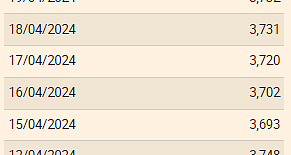Democrats took control of Congress and White House last year and have pledged to fight a wave new state laws that make it more difficult to vote. These laws were inspired by Donald Trump's false claims about a stolen election. After a brief flurry, however, their efforts were stalled in the narrowly divided Senate where they lack the 60 votes necessary to defeat a Republican filibuster.
Biden's visit to Washington is part of a concerted effort made by Senate Democrats, the White House, and others to revive the project and gain support for the modification of filibuster rules in order to advance legislation.
Republicans decry it all as a power grab.
There are also key issues among Senate Democrats. Moderate senators. Both Joe Manchin from West Virginia and Kyrsten Silena from Arizona said that they opposed the elimination of the Senate's 60 vote threshold in order to defeat a filibuster.
They claim such a change would permit for dramatic reversals of federal policy if the Senate loses party control. The Democrats would be back in trouble if they were in the minority because they would no longer be able to block legislation.
Biden delivered a fiery speech Tuesday in Atlanta. He compared opponents to the legislation with racist historical figures, and told lawmakers that they would be "judged on history."
On Thursday, Senate Majority leader Chuck Schumer stated on the floor that "If the right of vote is the cornerstone our democracy, then why can we in good conscience allow a situation where the Republican Party can debate voter suppression laws at state level and pass them with only a simple majority vote but not the United States Senate?"
To push the legislation forward, Democrats have changed their strategy. To bypass the Republican filibuster, they will be using existing Senate rules to push the legislation forward. They want to create a public debate that can last for days, echoing the civil rights battles that led to some famous filibusters in Senate History.
The new approach does not address the core problem Democrats face. They do not have the support of the Republicans to pass the election legislation on a bipartisan basis. However, they also lack the support of all 50 Democrats to change the Senate rules to allow them to pass.
Nearly all Republicans oppose the legislation. They view it as federal overreach and would limit states' ability to hold their own elections. They also pointed out that Trump opposed the changes to the filibuster when he was president.
"Nobody in the country is buying that fake hysteria that democracy would die unless democrats take total control," said Mitch McConnell (R-Ky.), Senate Minority Leader.
The Democratic package of voting legislation and ethics legislation would bring about the largest overhaul of U.S. election systems in a generation. It would remove all obstacles to voting that were enacted for the sake of election security, reduce the influence of big money in politics, and limit partisan influence on the drawing of congressional district lines. This package would establish national standards for election that will override state-level GOP laws. It would also allow the Justice Department to re-authorize its ability to enforce election laws in states that have a history discrimination.
The legislation is a political necessity for both Democrats and Biden. It would be a breach of a key campaign promise to Black voters that helped them win control of Congress and the White House. This would happen just before the midterm elections, when the Democratic majority will be very slim. This would be Biden's second major setback in a month. It comes after Manchin stopped work on President Obama's $2 trillion package for social and environmental initiatives just before Christmas.
Schumer originally set Jan. 17 as Martin Luther King Jr. Day to give lawmakers time to pass voting legislation or revise the filibuster rules. This vote could still take place.
Their new strategy uses a procedural shortcut so they can actually hold a bill debate without being stopped by a filibuster. This is a tactic that Republicans have used four times to stop the debate in recent months.
It works like this: On Thursday, the House amended a bill unrelated to that which had been approved by both chambers of Congress. This combined two separate voting bills for Democrats into one. The Senate can now debate the bill with a simple majority and bypass a filibuster, after the House passed it. However, the Senate Republicans could still block them from holding a final voting.
Schumer stated that Democrats plan to continue to examine changes to the filibuster after the debate over the bill.
Manchin, who was a key contributor to the writing of Democratic voting legislation, said Tuesday that any changes needed to be made with significant Republican buy-in, even though there aren’t any Republican senators ready to sign on.
This confused South Carolina Rep. Jim Clyburn. Clyburn, the No. 3 Democrat in Congress and a senior member the Congressional Black Caucus.
Clyburn challenged the wisdom of seeking bipartisanship by pointing out that newly freed slaves were granted the right to vote on a party-line basis.
Clyburn stated that Manchin seemed to be supporting a filibuster. "That is, to us, very disconcerting."

 The Euribor today remains at 3.734%
The Euribor today remains at 3.734% Germany: the trial of an AfD leader, accused of chanting a Nazi slogan, resumes this Tuesday
Germany: the trial of an AfD leader, accused of chanting a Nazi slogan, resumes this Tuesday New York: at Columbia University, the anti-Semitic drift of pro-Palestinian demonstrations
New York: at Columbia University, the anti-Semitic drift of pro-Palestinian demonstrations What is Akila, the mission in which the Charles de Gaulle is participating under NATO command?
What is Akila, the mission in which the Charles de Gaulle is participating under NATO command? What High Blood Pressure Does to Your Body (And Why It Should Be Treated)
What High Blood Pressure Does to Your Body (And Why It Should Be Treated) Vaccination in France has progressed in 2023, rejoices Public Health France
Vaccination in France has progressed in 2023, rejoices Public Health France Food additives suspected of promoting cardiovascular diseases
Food additives suspected of promoting cardiovascular diseases “Even morphine doesn’t work”: Léane, 17, victim of the adverse effects of an antibiotic
“Even morphine doesn’t work”: Léane, 17, victim of the adverse effects of an antibiotic MEPs validate reform of EU budgetary rules
MEPs validate reform of EU budgetary rules “Public Transport Paris 2024”, the application for Olympic Games spectators, is available
“Public Transport Paris 2024”, the application for Olympic Games spectators, is available Spotify goes green in the first quarter and sees its number of paying subscribers increase
Spotify goes green in the first quarter and sees its number of paying subscribers increase Xavier Niel finalizes the sale of his shares in the Le Monde group to an independent fund
Xavier Niel finalizes the sale of his shares in the Le Monde group to an independent fund Owner of Blondie and Shakira catalogs in favor of $1.5 billion offer
Owner of Blondie and Shakira catalogs in favor of $1.5 billion offer Cher et Ozzy Osbourne rejoignent le Rock and Roll Hall of Fame
Cher et Ozzy Osbourne rejoignent le Rock and Roll Hall of Fame Three months before the Olympic Games, festivals and concert halls fear paying the price
Three months before the Olympic Games, festivals and concert halls fear paying the price With Brigitte Macron, Aya Nakamura sows new clues about her participation in the Olympics
With Brigitte Macron, Aya Nakamura sows new clues about her participation in the Olympics Skoda Kodiaq 2024: a 'beast' plug-in hybrid SUV
Skoda Kodiaq 2024: a 'beast' plug-in hybrid SUV Tesla launches a new Model Y with 600 km of autonomy at a "more accessible price"
Tesla launches a new Model Y with 600 km of autonomy at a "more accessible price" The 10 best-selling cars in March 2024 in Spain: sales fall due to Easter
The 10 best-selling cars in March 2024 in Spain: sales fall due to Easter A private jet company buys more than 100 flying cars
A private jet company buys more than 100 flying cars This is how housing prices have changed in Spain in the last decade
This is how housing prices have changed in Spain in the last decade The home mortgage firm drops 10% in January and interest soars to 3.46%
The home mortgage firm drops 10% in January and interest soars to 3.46% The jewel of the Rocío de Nagüeles urbanization: a dream villa in Marbella
The jewel of the Rocío de Nagüeles urbanization: a dream villa in Marbella Rental prices grow by 7.3% in February: where does it go up and where does it go down?
Rental prices grow by 7.3% in February: where does it go up and where does it go down? Europeans: “All those who claim that we don’t need Europe are liars”, criticizes Bayrou
Europeans: “All those who claim that we don’t need Europe are liars”, criticizes Bayrou With the promise of a “real burst of authority”, Gabriel Attal provokes the ire of the opposition
With the promise of a “real burst of authority”, Gabriel Attal provokes the ire of the opposition Europeans: the schedule of debates to follow between now and June 9
Europeans: the schedule of debates to follow between now and June 9 Europeans: “In France, there is a left and there is a right,” assures Bellamy
Europeans: “In France, there is a left and there is a right,” assures Bellamy These French cities that will boycott the World Cup in Qatar
These French cities that will boycott the World Cup in Qatar Serie A: Bologna surprises AS Rome in the race for the C1
Serie A: Bologna surprises AS Rome in the race for the C1 Serie A: Marcus Thuram king of Italy, end of the debate for the position of number 9 with the Blues?
Serie A: Marcus Thuram king of Italy, end of the debate for the position of number 9 with the Blues? Milan AC-Inter Milan: Thuram and Pavard impeccable, Hernandez helpless… The tops and flops of the derby
Milan AC-Inter Milan: Thuram and Pavard impeccable, Hernandez helpless… The tops and flops of the derby Ligue 2: Auxerre leader, Bordeaux in crisis, play-offs... 5 questions about an exciting end of the season
Ligue 2: Auxerre leader, Bordeaux in crisis, play-offs... 5 questions about an exciting end of the season


















